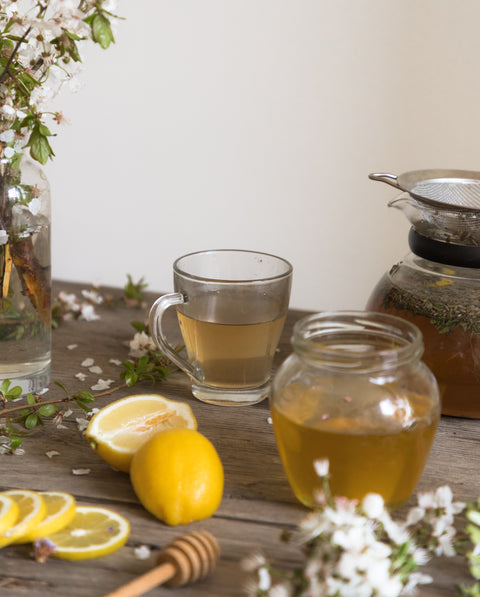Why is Sun Good for You? 7 Radiant Benefits
Are those warm, bright rays from the sun healthy or harmful?
The answer is both. Sun exposure carries positives and negatives for our health.
But as you’ll learn today, the incredible benefits are totally worth the effort to minimize the risks.
We’ll explore the science behind these perks for your physical, mental, and emotional health. Then we’ll share the best tips to welcome those sunny vibes safely.
Ready to glow from the inside out?
7 Ways Soaking Up the Sun Benefits Your Health
Basking in the daylight delivers more than a sun-kissed radiance for your selfies. It can help:
1. Increase Vitamin D Levels (aka the “Sunshine Vitamin”)
Unlike other essential vitamins we can get from our diet, the sun’s ultraviolet (UV) rays trigger vitamin D production through our skin [*]. That’s why experts say most cases of vitamin D deficiency are due to a lack of sun exposure [*].
Higher vitamin D levels lead to stronger bones and healthier teeth. It helps your body absorb calcium and phosphorus, which are necessary to grow and maintain their health and integrity. This may mean fewer fractures and dental issues, especially as you age.
Studies even suggest higher vitamin D levels may enhance reproductive health and fertility outcomes for both women and men [*].
So consider heading outside to boost the power of your daily walks!

2. Support Your Immunity
Scientists learned that a deficiency in vitamin D is associated with a higher chance of autoimmune conditions and susceptibility to infections [*].
So studies show vitamin D snagged via sunlight exposure may help regulate our immune responses to reduce the risk of autoimmune diseases such as [*]:
- Rheumatoid arthritis
- Multiple sclerosis
- Lupus
- Inflammatory bowel disease (IBD)
Researchers also believe higher vitamin D levels may protect you from asthma and both bacterial and viral infections [*]. This may explain why the flu and bronchitis are more severe when people spend the least time in the sun (winter) and have lower vitamin D levels.
3. Promote Heart Health
Research suggests that sunlight exposure may improve cardiovascular health and reduce the risk of heart disease. According to studies, sunlight may help [*][*][*][*]:
- Lower blood pressure
- Improve overall circulation
- Lower cholesterol
When participants with high blood pressure were regularly exposed to full-spectrum UV rays over three months, their blood pressure dropped to the normal range [*].
4. Keep Your Brain Healthy as You Age
Researchers have noticed a correlation between vitamin D deficiency and higher risks for dementia, memory loss, cognitive decline, and executive dysfunction, especially in elderly adults [*][*].
One study even revealed that low vitamin D levels in mentally healthy elderly participants predicted cognitive impairment less than five years later [*].
Though clinical trials are ongoing, many scientists believe higher vitamin D intake via sunlight may be neuroprotective and help reduce these risks.
We can’t think of a better reason to make the most of long summer days.
5. Elevate Your Mood
People with seasonal affective disorder (SAD) suffer from depression, low self-esteem, low moods, tiredness, irritability, etc., during the winter months [*]. However, these tend to clear up in the spring and summer.
One reason for this may be due to serotonin. This “feel-good” neurotransmitter plays a role in our happiness, optimism, emotions, and overall well-being [*].
Since sunlight exposure triggers the release of serotonin, we usually have higher serotonin levels in the late summer and fall and lower levels in the winter and early spring [*].
So sunlight may be a viable treatment option for people with SAD and nonseasonal depression [*].
🧠 Use these tips to take better care of your mental health.

6. Improve Your Sleep
Sunlight helps regulate our body’s circadian rhythm, or the process that controls our sleep-wake cycle. The sooner our body detects sunlight in the morning, the easier it becomes to fall and stay asleep at night [*].
This is because our internal melatonin factory runs on a timer.
Melatonin is a hormone that promotes sleep. It assumes that sunlight means it’s time to be an energized morning person, so it turns itself off. Once it detects darkness several hours later, it kicks into gear and makes you yawn.
Without sunlight, our melatonin doesn’t know what time it is. It may struggle to turn on, leading to insomnia. Or it may not produce enough, and you’ll wake up in the middle of the night.
🌞 Psst! Have you considered adding sunlight to your successful morning routine?
7. Lower Your Risk of Certain Types of Cancer
Even though the risk of skin cancer may be higher with prolonged sun exposure, researchers around the world think it may prevent others.
They say people with low vitamin D levels living in areas with the least sunlight have a higher risk of developing up to 15 cancers, including breast, colon, lung, lymphoma, pancreatic, ovarian, and prostate [*].
On the other hand, people who live in sunny locales and have higher levels of the sunshine vitamin face much lower risks.
Though the correlations are strong, more studies are needed to confirm this news.
How To Stay Safe In The Sun ☀️
Now that you know all the benefits of sunlight, you’re probably eager to take a day hike or plan a picnic. We’re all for it! Aim for 15 to 30 minutes of sun exposure on your arms, legs, or face daily.

To practice sun safety:
- Visit your doctor for annual skin checks to catch potential signs of skin cancer sooner than later.
Follow our tips to enjoy these fun summer activities and sneak more sunshine into your days without risking your health.
Happy sunning! 😎
Author: Devan Ciccarelli
Email: devan@behappynothangry.com
Instagram/Facebook Group: @behappynothangry/Be Happy Not Hangry
Website: www.behappynothangry.com




